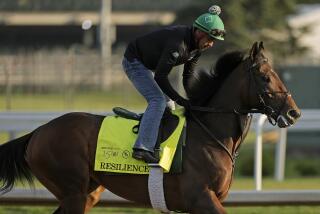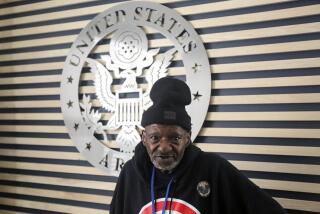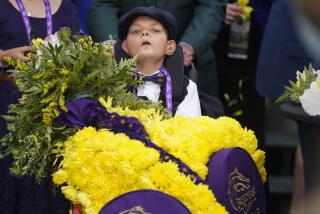âItâs just me and the horseâ: How mustangs help hurting veterans heal
Reporting from Poplar Grove, Ill. â The stallion kicked out, nostrils flaring. In the ring, it faced off against a 32-year-old former infantryman.
Months ago, Mitchell Reno was sitting in a hotel room with half a gallon of vodka and dark plans. But this April afternoon found him serenely still as a stallion kicked up sawdust in an arena in Poplar Grove in northern Illinois. Slashes across the horseâs heaving belly and back revealed fights in the Wyoming wild.
The horse zeroed in on Reno, who wrestles with post-traumatic stress disorder and knows a thing or two about scars, the kind you can see and the kind you canât.
âWhenever I get in the ring, itâs just me and the horse,â said Reno, who served in Iraq and Afghanistan in 2003. âNothing else matters.â
An explosion in Iraq left Reno with a traumatic brain injury, ending the Texas nativeâs military career.
Mustangs help him in a way, he said, that years of therapy, medication and turning to alcohol couldnât.
Reno and the mustangs are part of BraveHearts, the countryâs largest free equine-assisted services program for veterans, says Meggan Hill-McQueeney, BraveHearts president.
Many veterans arrive at BraveHearts after trying medication and therapy. The program provides work and hope for vets who are looking for purpose â a goal to work toward.
Veterans gentle the stallions â themselves traumatized by being relocated â acclimating them to things like saddles and halters.
âThe veteran doesnât want to change because of what Iâm telling them,â said Patrick McKevitt, BraveHeartsâ director of operations. âThey want to change because youâre going to help the horse. And the horse ends up helping you.â
Reno is sober now. He can sleep at night. But not everything is perfect â itâs hard to be away from his wife and the kids whose grinning faces fill his iPhone photo stream.
The horses, though, make âlife worth living,â he says.
I came back, and I hated myself. The pills didnât fix anything.
— Mitchell Reno, veteran of Iraq and Afghanistan
BraveHearts, serving soldiers since 2007, works with the federal Bureau of Land Management to corral wild horses from Wyoming in an effort to curb population growth. Veterans work with the horses once they arrive in Illinois, and McKevitt and Hill-McQueeney help them train.
McKevitt and Hill-McQueeney pull people âright out of the gutter,â says Reno.
The gutter has been a familiar place for Reno.
Earlier this year, he was in a hotel room with the half-gallon of vodka, making a noose out of parachute cord.
Heâd already used the vodka to swallow his wedding ring. Heâd tossed his cross necklace into the Chicago River.
The suicide attempt capped rocky years when he was arrested for assault, divorced twice and often drunk.
âI came back, and I hated myself,â he said. âThe pills didnât fix anything. The booze just hid the feelings of guilt.â
Reno first came to BraveHearts two years ago while at the PTSD program at Captain James A. Lovell Federal Health Care Center in Chicago.
He met the horses, which reminded him of the three he had growing up, but that bright spot barely pushed back struggles that were years in the making. He found his way back to booze and eventually the hotel room.
Renoâs wife, Corinne, remembers the time as one of many when she couldnât reach him. Sheâd call friends, hospitals, the VA.
Then she called McKevitt.
McKevitt summoned Reno back to BraveHearts.
Reno said he finds calm with the tense, distrustful animals and knows he can help.
âI have a lot of the same feelings,â he said.
The idea of working with stallions almost seems counterintuitive. Wouldnât the best animals for veterans seeking stability be gentle and reliable?
Hill-McQueeney has found itâs the wild ones.
Mustangs donât trust humans, said Steve Mantle, who runs a wild horse adoption facility in Wheatland, Wyo.
âThey donât want anything from you. They were fine on their own,â said Mantle, who shared his mustang-training techniques last year at BraveHearts.
âThe vets maybe come from that same position of needing to trust someone but not sure they can,â he added. âSo the two meld together.â
Reno readily acknowledges that people who knew him years ago would not recognize him today â heâs chosen a calmer life and talks openly about his feelings.
âIâm starting to have a little bit of patience for myself,â he said. âI havenât had a life until recently, honestly. Not any kind of life that anybody would want.â
Working with horses seems to be working for Reno, and many advocates hope that bringing veterans to stables will be as common a treatment for PTSD as medications and therapies offered by the Department of Veterans Affairs.
Back in the arena, McKevittâs soft, Irish brogue encouraged Reno. Gentle, gentle, he repeated. Bring your hand down, but just so. Donât get too close. Youâre in the strike zone. Watch his left hoof.
âHeâs kind of like you,â McKevitt said. âHeâs a tornado.â
McKevitt instructed Reno how to move a rod with a silver sack tied to the end, just so, to touch the horse from afar.
The idea is that itâs like a hand, helping the mustang adjust. To learn trust.
Renoâs slow, calm movements toward the horse turned the arena so still that the only sounds were buzzing fluorescent lights.
Two steps forward, one step back. A delicate dance of hoofs and work boots.
After inching close enough to touch Boo-Yahâs cheek â a successful moment with a stallion whoâd been haltered only the day before â Reno climbed the fence, grinning.
âYou get a sense of peace like no pill they could put down your throat,â he said. âIâm starting to look forward to the next 20 years of my life.â
Reno hopes to return to his family in Texas and help other veterans into the saddle. It helps them, he said, âwalk out with a little bit of hope and strength.â
Mary Apper, 35, also knows how the bond with horses soothes.
After returning from a Navy deployment to Afghanistan, Apper said, the only solace she found from wrestling with PTSD and rage was her 29-year-old quarter horse, Satin.
On the worst nights, she slept in Satinâs stall.
âShe was literally the only thing that could melt my anger,â said the damage controlman, who is on active duty. âMy mom always said that my love for her was stronger than my anger for what Iâve been through.â
Horses, medical and animal experts say, force calm.
âThey have a level of hypervigilance,â said Dr. Anthony Peterson, section chief of the PTSD program at Lovell. âSo if you have a population of individuals with PTSD who themselves carry a level of nervousness or anxiety on a day-to-day basis, when they interact with the animals, it really challenges them.â
Veteran Nicholas Montijo, 28, greets the busload of Milwaukee veterans arriving each Tuesday. BraveHearts served more than 500 veterans in 2015.
Before coming to BraveHearts, Montijoâs mind was buzzing with replays of the chaotic calls he received as a radio operator in Afghanistan.
âI relive a lot of that stuff,â he said. âIt goes through my brain like a big old recording.â
His first deployment, he remembers, was fun â traveling to exotic ports, experiencing different cultures. But the second, to Afghanistan, was haunting.
He returned a man without purpose â broken and silent.
âYou couldnât get me to talk,â he said.
Now, his colleagues joke, thatâs not a problem.
Showing a guest around the ranch, pointing out horses and their quirks â this oneâs pals with the donkeys, this one thinks heâs getting fed soon â it was hard to believe he was ever anything but a friendly greeter and natural leader.
Riding gave him purpose, a goal, a bond.
Apper, who is stationed at nearby Naval Station Great Lakes, is teaching Montijo to be a riding instructor for other veterans.
Barking out orders, Apper directed a riding group trotting single file on a recent afternoon. Her clipped, confident tone revealed her drill-instructor background.
When her beloved horse, Satin, had to be put down last August, her mother flew out and âpretty much forced me to come out here,â Apper said of BraveHearts.
Devastated, she hesitated to be near horses again. But during that visit, someone told her about a filly needing work.
âI just got this ridiculous feeling,â she said. âAnd I realized, âOh, my God, Iâm happy.ââ
A few months ago, she was surprised by streamers and balloons affixed to a stall with the news that BraveHearts was giving her CC, a beautiful gray mare with white eyelashes.
When Apper walks to her pasture, the horseâs head bobs up immediately, nose lifted to nuzzle.
âThis little filly saved my life,â she said.
ALSO
A quiet day of remembrance at Riverside National Cemetery
Op-Ed: Memorial Day in Americaâs national parks: Wish you were here
Subsidized rent, but nowhere to go: Homeless vouchers go unused
Alison Bowen writes for the Chicago Tribune.
More to Read
Sign up for Essential California
The most important California stories and recommendations in your inbox every morning.
You may occasionally receive promotional content from the Los Angeles Times.










